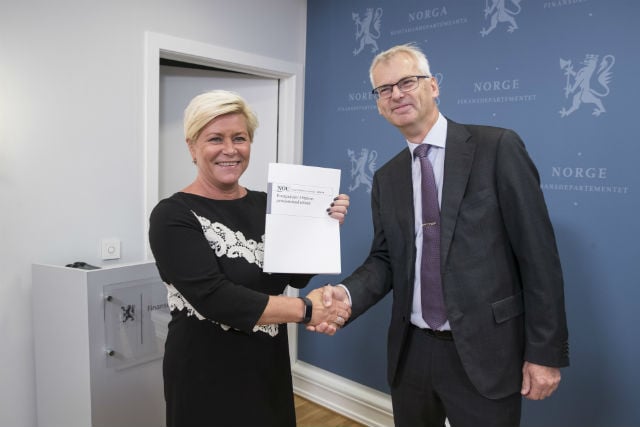OIL FUND
Norway oil fund told to ignore divestment calls
Norway’s government pension fund has been advised to hold on to its near 320bn NOK ($40bn) stakes in oil and gas companies, angering politicians who support the international divestment campaign.
Published: 24 August 2018 12:23 CEST

Norwegian Finance Minister Siv Jensen receives the expert report from Øystein Thøgersen, rector at the Norwegian School of Economics. Photo: Vidar Ruud / NTB scanpix
An expert group on Friday handed in a report to Finance Minister Siv Jensen which concluded that there was no compelling economic argument to sell out of oil and gas shares.
“Selling the energy shares in the Government Pension Fund Global is not an effective insurance against lower oil prices in the future,” Øystein Thøgersen, Rector of the Norwegian School of Economics and Business Administration (NHH) said as he handed in the report. “The energy shares in the fund only provide a marginal contribution to the nation's oil price risk.”
Arild Hermstad, spokesman for the Green Party said the report was “hair-raising”, and argued that if the government took its recommendations on board they would be ignoring the 2015 Paris Agreement on the climate.
“The Norwegian people would benefit from the fund being withdrawn from fossil fuels, and it would send a clear signal internationally,” he said. “It would positively affect our children and grandchildren's future through creating a better climate, while at the same time paying off in our wallets.”
The Finance Ministry appointed the committee after Norges Bank, which oversees the fund, suggested removing the oil and gas sector from the reference index for the fund’s international share portfolio.
The group was asked to consider the economic rather than environmental rationale for selling the shares, with experts asked to look at whether divestment would function as a hedge against the risk of a permanent decline in the value of Norway's remaining oil reserves.
The group argued that selling the energy shares would only cover one percent of the potential decline in Norway’s oil revenues if there were a sustained fall in oil prices.
At the press conference, Jensen said she looked forward to reading the analysis.
“The government will present our assessment later this autumn,” she said.
Kari Elisabeth Kaski, fiscal spokesperson for the Socialist Left party, was also disappointed with the expert’s report.
“Investing the oil fund in increased greenhouse gas emissions today contributes to climate change and poorer returns in the long term,” she said. “Today we are making money if the world does not reach its climate targets. It's not right and it's not wise, when the emerging markets are in green industries rather than oil and gas.”
The fund’s oil and gas investments constitute about 3.5 percent of its total holdings. The largest investments are BP (NOK 25 billion), Exxon (NOK 25 billion), and Shell (NOK 50 billion).
Url copied to clipboard!


 Please whitelist us to continue reading.
Please whitelist us to continue reading.